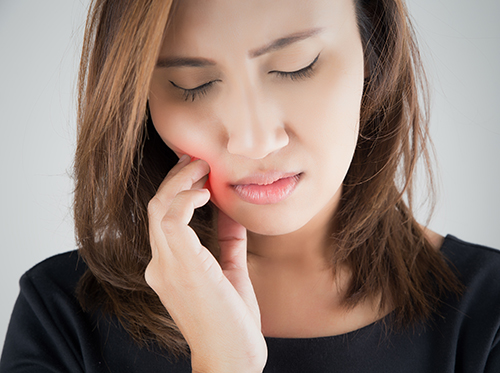What makes a periodontist different from a dentist?
January 19th, 2022

“Dentists, periodontists … what’s the difference, anyway?” We hear our patients asking this question as they wonder about the difference between the two specialties. Periodontists like Drs. Angela Paros, Amer Atassi, Eric Young, Alexander Katsnelson are more than just oral health professionals. Unlike dentists, who act more like general practitioners, periodontists focus on treating the soft tissue (gums) and bones supporting the teeth, as well gum disorders. Sure, dentists can prevent the onset of gum disease through regular cleanings and prescribing medications. But it is periodontists who are required for more complex and advanced cases of gum disease called periodontitis, a gum infection that, if left untreated, can lead to tooth loss. Periodontitis is a condition that most dentists simply don’t treat. The most severe cases of periodontitis can even lead to serious health problems such as diabetes, heart disease, and cancers of the head, neck, and pancreas.
To make things simpler, we’ve come up reasons for when you should visit the dentist and when you should give us a call to book an appointment with Drs. Angela Paros, Amer Atassi, Eric Young, Alexander Katsnelson:
Visit your general dentist for:
- Checkups and cleanings
- X-rays
- Filling cavities
- Root canals
- Tooth extractions
- Crowns or bridges
- Select cosmetic procedures such as veneers, bonding, and teeth whitening
- Pediatric (children’s) care
Visit Drs. Angela Paros, Amer Atassi, Eric Young, Alexander Katsnelson for:
- Deep pocket cleanings (to remove debris and infection-causing bacteria)
- Bone grafts
- Soft tissue removal
- Scaling and root planing (deep cleaning)
- Implant replacement
- Crown lengthening
- Osteoplasty (hard tissue recontouring)
- Gingivoplasty (soft tissue recontouring)
To learn more about the differences between periodontists like Drs. Angela Paros, Amer Atassi, Eric Young, Alexander Katsnelson and your general dentist, or to schedule your next visit, please give us a call today! We look forward to seeing and treating you!
Toothaches and Abscesses
January 12th, 2022

With Drs. Angela Paros, Amer Atassi, Eric Young, Alexander Katsnelson, emergency dental care is only a phone call away. Dental problems are uncomfortable and should always be treated as soon as possible to prevent them from getting worse.
Whether it’s an abscess or a toothache that you believe might be something more, it’s vital to pay attention to your body and give it the attention it needs. Below, you’ll find some more information about abscesses and toothaches that may clarify any doubts about the differences, whether you may be suffering from one of them … and what to do if you are.
Abscesses
What’s an abscess? It’s a bacterial infection: an accumulation of pus that can form inside a tooth or the gums and cause pain and swelling. It generally develops as a result of poor oral hygiene.
Bacteria lives in plaque so if plaque isn’t removed on a regular basis, it can build up and encourage bacteria to spread, which could ultimately result in an abscess. Antibiotics aren’t always needed for treatment, you should get this situation checked out as soon as possible. If left untreated, oral infections can lead to bigger complications.
Toothaches
Toothaches can happen for a number of reasons. The simplest, most common one is a piece of food that is stuck in your gum, which can cause a bit of swelling and discomfort.
To get rid of it, you can rinse your mouth with hot water and salt, every morning and evening. This helps kill bacteria and bring down the swelling. You can also gently floss the area to remove whatever is stuck there. If you experience bleeding while you’re flossing, and hot water with salt proves ineffective, it may be time to schedule an appointment.
If you’re especially sensitive to cold and heat, you may often experience toothaches. If this is the case, we can recommend a pain reliever to reduce the discomfort, but it’s worthwhile to come in for a check-up anyway to make sure the problem doesn’t get worse.
The last (and most obvious) reason for a toothache is a cavity. Depending on how bad it is, we might fill it or place a crown. The tricky thing with cavities is that sometimes you may not know you have one at all, especially when they’re just starting out. The best way to prevent them from getting worse and creating toothaches is by keeping up with your regular dental cleanings.
At High Point Dental Group, we’re here to assist you through any and all your dental emergencies! We encourage you to make an appointment at our Romeoville, IL office if you notice any signs of discomfort, so we can provide the most efficient care for you.
Resolving to Eat Better in the New Year
December 29th, 2021

It’s a new year, and a resolution found on many lists is learning to be more mindful about healthy food choices. You might have set some of these goals yourself. Gaining, losing, or maintaining your current weight. More fruits and veggies. Better proteins. Less sugar. Fewer carbs. You want to make this new year your healthiest year yet.
And while you’re making your new and improved shopping list, don’t forget your oral health! Because while brushing and flossing are extremely important, your diet can also have very real benefits for your teeth and gums.
Stronger Teeth and Jaws
We often talk about teeth and bones together, and that’s natural. Calcium and phosphorus, as well as other minerals, make them the strongest parts of our bodies. When teeth lose mineral strength, they are more vulnerable to cavities, and bone loss in the jaw can cause loose or even lost teeth.
Making sure you get the recommended daily amount of the minerals and vitamins you need will help sustain and repair both teeth and bones. A diet rich in calcium, phosphorus, and vitamin D helps build strong bones and promotes bone density. While your teeth can’t create new enamel, minerals that are eroded by acids from plaque and acidic foods can be restored, or remineralized, with the calcium and phosphates in saliva.
- Calcium
Strong teeth and bones need calcium. More than 99% of the calcium in our bodies is located in our teeth and bones. How to make sure we get enough?
Dairy products are the traditional answer. Several servings of milk, cheese, or yogurt each day supply most of our needs. If you can’t eat dairy, though, calcium is also found in other foods, such as salmon, sardines, many dark leafy vegetables, and fortified juices, tofu, and cereals.
- Phosphorus
Calcium gets most of the attention when it comes to creating strong teeth and bones, but it’s not a solo act. We need phosphorus to make full use of the calcium in our diets.
Proteins like meat, fish, and poultry are good sources of phosphorus, as are beans, nuts, whole grains and dairy.
- Vitamin D
Vitamin D is a diet essential because it enables us to absorb the calcium and phosphorus that keep teeth and bones strong.
Most dairy and many other foods are fortified with vitamin D, such as cow’s milk, soymilk, orange juice, and cereals. Egg yolks and fatty fish, such as salmon, tuna, and herring, are also a rich natural source of the vitamin.
Healthy Gums
Gum disease is more than just a nuisance. Left untreated, gingivitis (early gum disease) can become periodontitis (serious gum disease). Periodontitis can cause infection, loose teeth, and tooth and bone loss.
Brushing and flossing promote gum health and help prevent gum disease, but your diet plays an important role, too.
- Vitamin A
Vitamin A is essential for the health and healing of mucous membranes, including gum tissue and the soft membranes in the mouth.
You can get this vitamin directly from animal products such as dairy foods and meats, or it can be formed in the body from beta-carotenes. Think orange when you hit the produce aisle, because foods such as carrots, peppers, pumpkin, squash, and sweet potatoes are a rich source of beta-carotenes.
- Vitamin C
Vitamin C is one of the so-called “essential nutrients.” These are the nutrients that are necessary for our bodies to function properly, and which can only be supplied in our diets. Vitamin C is vital for healthy gums and soft tissue—in fact, one sign that your diet is deficient in vitamin C is inflamed and bleeding gums.
Citrus fruits, those oranges, lemons, limes, grapefruit, and all their cousins, are a wonderful source of vitamin C, but you have many other flavorful options. Fruits such as kiwis, mangos, papayas, and strawberries are rich in vitamin C. Step over to the vegetable aisle to load up on red peppers, kale, cauliflower, Brussels sprouts, and broccoli—all of which contain more vitamin C per serving than a medium orange!
Fewer Cavities
Plaque thrives on a diet of sugar. Oral bacteria in plaque use the sugars in our food to produce acids. These acids erode enamel and eventually lead to cavities. Limiting your sugar consumption and choosing complex carbohydrates over simple carbs are two ways to reduce your risk of cavities.
- Sugars
The usual suspects—candies, desserts, pastries, sodas—are sugar-filled items you’re familiar with. What might surprise you is the amount of sugar in sports drinks, fruit juices, flavored yogurts, breakfast cereals, and other standard grocery purchases. Checking labels for sugar content is a great way to cut down on unexpected sweeteners.
- Carbs
The refined starches in white bread, white rice, potato chips, and other simpler carbohydrates quickly break down into sugars. This is the kind of nutrition only plaque appreciates.
Instead, fill your cart with complex carbohydrates, which contain important vitamins, minerals, and fiber. Found in foods like whole-grain breads and cereals, legumes, and many vegetables, complex carbs break down slowly for longer-lasting energy.
Of course, these suggestions don’t cover everything on your healthy dental shopping list. We could add magnesium for bone density, vitamin B to prevent oral irritation and inflammation, vitamin K for bone strength, and more. To find out the best options for your healthiest smile, talk to Drs. Angela Paros, Amer Atassi, Eric Young, Alexander Katsnelson or a member of our Romeoville, IL team about ideas for improving your daily diet.
Because besides leading to stronger teeth, healthier gums, and fewer cavities, a careful and conscious approach to your food choices has another wonderful benefit—a healthy dental diet is healthy for the rest of your body as well. Just something to be mindful of as we greet the new year!
Women’s Medications and Dry Mouth
December 22nd, 2021

Women using medication to treat a variety of medical conditions are often unaware of the potential side effects. One common side effect of medications such as blood pressure medication, birth control pills, antidepressants, and cancer treatments is dry mouth. The technical term for dry mouth is xerostomia.
Xerostomia can lead to undesirable effects in the oral cavity including periodontal disease and a high rate of decay. Many women who have not had a cavity in years will return for their routine exam and suddenly be plagued with a multitude of cavities around crowns and at the gum line, or have active periodontal disease. The only thing that the patient may have changed in the past six months is starting a new medication.
Saliva washes away bacteria and cleans the oral cavity, and when saliva flow is diminished harmful bacteria can flourish in the mouth leading to decay and gum disease. Many medications can reduce the flow of saliva without the patient realizing the side effect. Birth control pills can also lead to a higher risk of inflammation and bleeding gums. Patients undergoing cancer treatments, especially radiation to the head and neck region, are at a greatly heightened risk of oral complications due to the possibility of damage to the saliva glands.
There are many over the counter saliva substitutes and products to temporarily increase saliva production and help manage xerostomia. One great option for a woman with severe dry mouth or high decay rate is home fluoride treatments. These work in a number of ways, including custom fluoride trays that are worn for a short period of time daily at home, a prescription strength fluoride toothpaste, or an over the counter fluoride rinse. If you have more questions on fluoride treatments, make sure to ask Drs. Angela Paros, Amer Atassi, Eric Young, Alexander Katsnelson at your next visit to our office.
The benefits of many of the medications on the market outweigh the risks associated with xerostomia, however, with regular exams you can manage the risk and prevent many oral consequences of medications.






